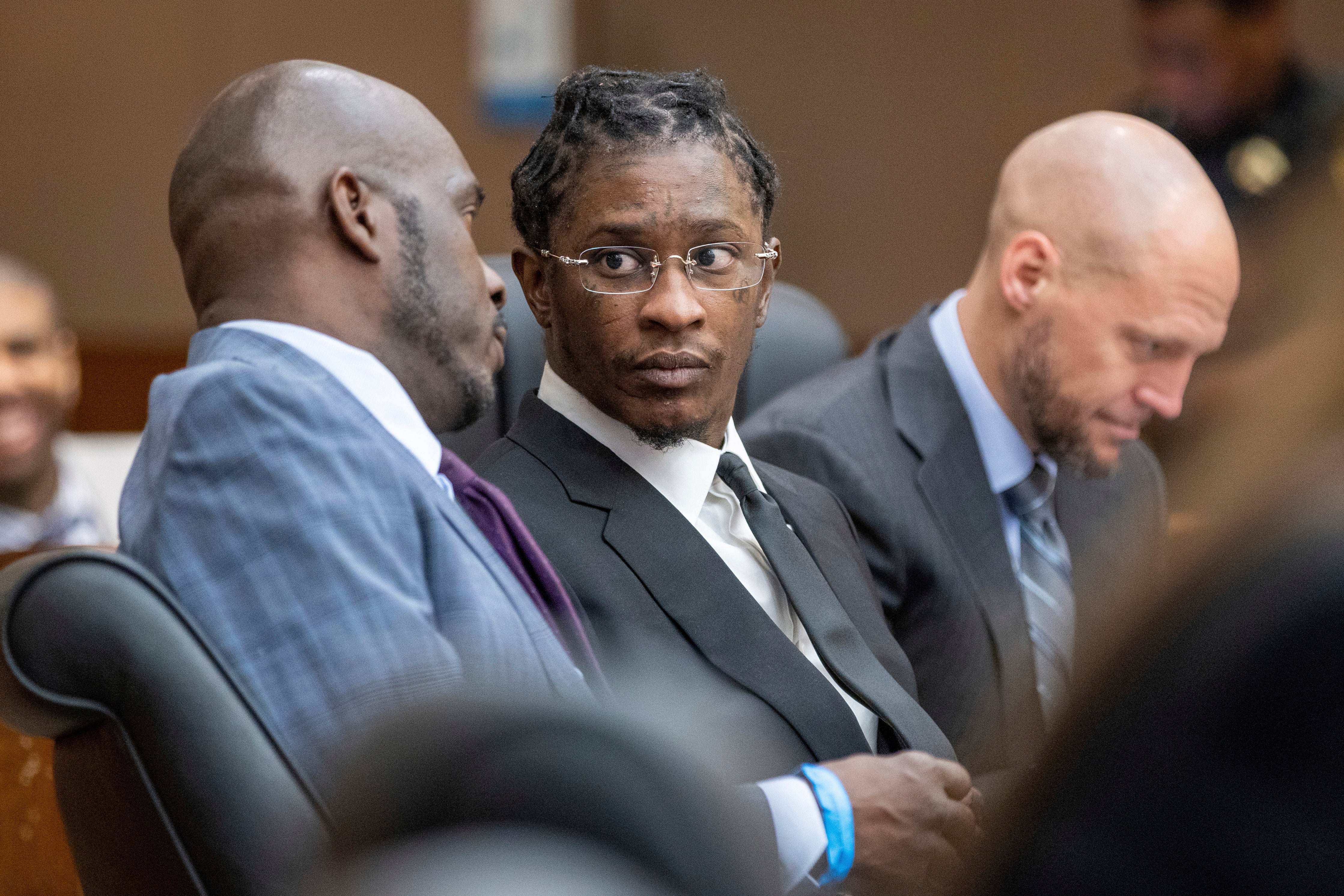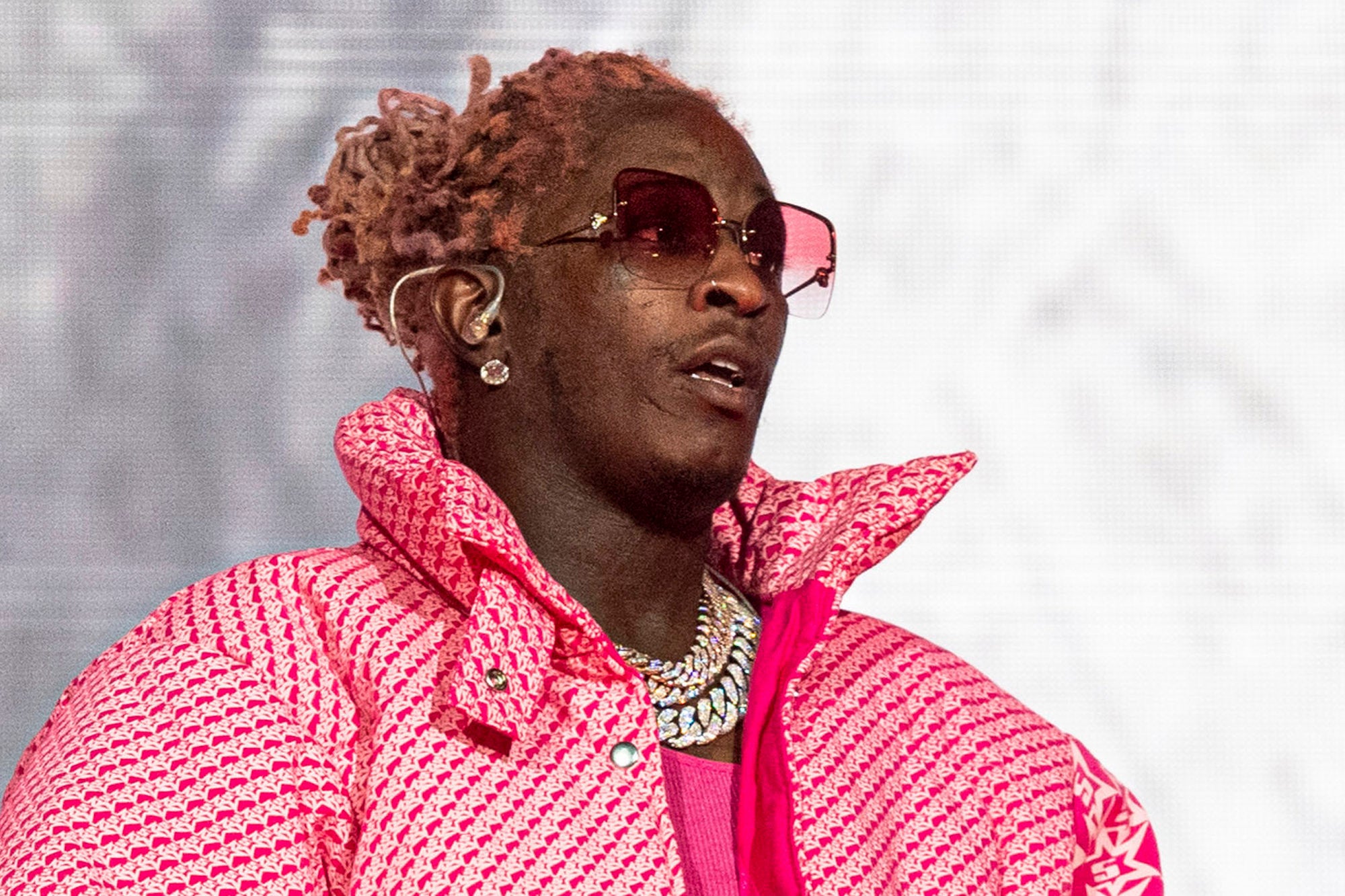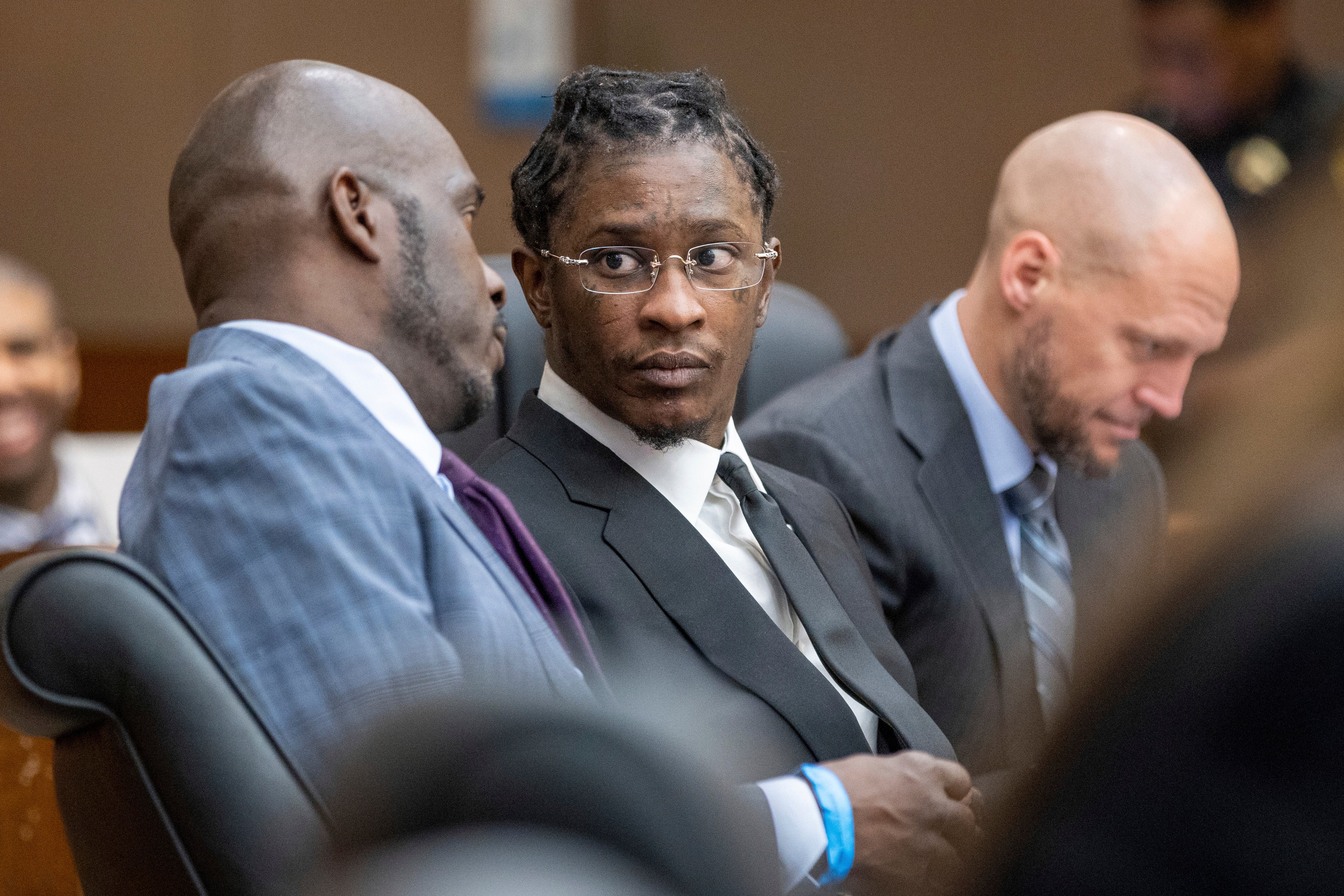Young Thug, YSL and questionable lyrics: The controversial ‘gang’ trial, explained
The chart-topping artist and several others are accused of being part of a criminal street gang named YSL. Mike Bedigan reports


The trial of Atlanta-based rapper Young Thug finally got underway in Georgia, nearly 11 months after jury selection first began.
The chart-topping artist, along with several others, is accused of violent crimes and racketeering as part an alleged criminal street gang named YSL.
Jury selection for the trial began in January, but faced numerous challenges – from getting the defendants housed in different jails to court each day to dealing with contraband in the courtroom and – wildly – the arrests of a defence attorney and a courtroom deputy.
The saga in the courtroom has led to lengthy delays in the trial, which is expected to last months, getting underway.
Finally, opening statements began on 27 November.
Here’s what you need to know.
Who is Young Thug?
Born in 1991 as Jeffrey Lamar Williams, Young Thug is an Atlanta-born rapper. He also goes by the name Slime.
After starting his career at the age of 19, he signed with Gucci Mane’s record label, and went on to become one of the most influential artists on the contemporary hip-hop and trap music scene.
His first two albums “So Much Fun”, in 2019, and “Punk”, in 2021, debuted at the top of the Billboard 200, as did his 2021 joint compilation album with Gunna, “Slime Language 2”.
Young Thug has also featured in multiple collaborations that have earned him several number one hits.
These include guest spots on Camila Cabello’s Havana in 2018, Travis Scott and MIA’s Franchise in 2020 and Drake and Future’s Way 2 Sexy in 2021, all of which topped the Billboard Hot 100.
He also co-wrote the hit song This Is America with Childish Gambino, real name Donald Glover, which became the first hip-hop track to win Song of the Year at the Grammy Awards in 2019.

Young Thug is also noted for his style, with a 2016 GQ article describing him as “a leader of the psychedelic fashion movement of rap hippies”.
“He is unapproachable. He radiates volatility. I can’t even imagine him making actual, on-purpose eye contact with another human,” the article states.
What is YSL?
It depends who you ask.
YSL is Young Thug’s own record label – Young Slime Life. Artists on his record label are considered part of the “Slime Family,” and a compilation album, “Slime Language 2,” rose to number one on the US charts in April 2021.
Its artists include Gunna and Lil Keed, though several contemporary artists, including Future, Lil Uzi Vert, Playboi Carti, Lil Baby, and Travis Scott have also expressed allegiance to YSL without being contractually signed.
However, according to prosecutors, YSL is actually a “criminal street gang”, which started out in the Cleveland Avenue area of Atlanta and claims affiliation to the national Bloods gang.
According to a sprawling 88-page indictment, the members of YSL use “a variety of identifiers including colours, clothing, tattoos, and hand signs” to show their allegiance to the group.
The most predominant colours used by members of YSL are red for Bloods and green for Slime.
Defence attorneys meanwhile insist that YSL is just a music label.
What are the charges against YSL members?
The YSL members named in the indictment are charged with conspiracy to violate Georgia’s Racketeer Influenced and Corrupt Organizations (RICO) Act.
The act is similar to its federal counterpart, which is used to convict large-scale organisations such as the mafia.
According to the indictment, associates of YSL “conspired to associate together and with others for the common purposes of illegally obtaining money and property through a pattern of racketeering activity”.
It claims that YSL members were involved in murder, attempted murder, armed robbery, aggravated assault with a deadly weapon, theft, drug dealing, carjacking, and witness intimidation.
Other activities include “the posting of messages, images, videos and songs, demonstrating allegiance to the enterprise and willingness to engage in violence on its behalf”.
Prosecutors claim they can show that some of the group’s lyrics are related to crimes that they are accused of committing.

Through these activities and more the gang aimed to “preserve, protect, and enhance the reputation, power and territory” of the enterprise, prosecutors said.
Where does Young Thug fit in?
The indictment portrays Young Thug as the leader of the criminal gang, which was responsible for multiple violent crimes, including murders, shootings and carjackings.
Prosecutors say the rapper also used his music and social media posts to promote the gang,
He is also alleged to have committed multiple crimes that he has not been charged with.
While he is not being charged for such “overt acts”, they lend credence to the allegation that the group of defendants were together engaged in a criminal conspiracy.
Brian Steel, Young Thug’s lawyer, told The New York Times: “Mr Williams came from an incredibly horrible upbringing, and he has conducted himself throughout his life in a way that is just to marvel at. He’s committed no crime whatsoever.”
How long has Young Thug been behind bars?
Young Thug has been in prison since his arrest in May 2022.
In November, a jury was finally selected after almost one year – with over 2,000 people having been summoned to possibly serve.
Opening statements finally kicked off on 27 November.
The Atlanta Journal-Constitution reports that the trial could end up being the longest in Georgia’s history.
Has the case been controversial?
The use of lyrics from rappers associated with YSL and Young Thug in the case has been an ongoing point of contention.
Earlier this month, Fulton County Superior Court Chief Judge Ural Glanville ruled that he would allow prosecutors to introduce 17 sets of lyrics, as long as they can show that the lyrics are related to crimes that the rapper and other defendants are accused of committing.
Defence attorneys had asked the judge to exclude them, arguing the lyrics are constitutionally protected speech and would be unfairly prejudicial.

“The question is not rap lyrics. The question is gang lyrics,” prosecutor Mike Carlson said, during a pre-trial hearing. “These are party admissions. They happen to come in the form of lyrics.”
Mr Carlson had argued that First Amendment speech protections do not apply because the defendants are not being prosecuted for their lyrics. Instead, he said, the lyrics refer to the criminal act or the criminal intent related to the charges.
Another prosecutor, Simone Hylton, also separated the lyrics into three categories: those that prove the existence of YSL as an enterprise, those that show the gang’s behaviour and actions, and those that show that Young Thug is a leader of the gang.
How has the music industry reacted to the trial?
Several big names in the music industry have expressed support for YSL and hit out at prosecutors’ efforts to use their own lyrics against them.
Canadian superstar Drake referenced the case in the track Sticky on his new album Honestly, Nevermind.
“Somebody’s getting paid and/Free Big Slime out the cage,” Drake says in the song.
Killer Mike of rap group Run The Jewels previously told ABC News: “Hip hop is not respected as an art because Black people in this country are not recognised as full human beings.
“If we allow the courts to prosecute these men based on characters they created and stories of pretend that they tell in rhyme then next, they’ll be at your door.”
The trial
The trial has been nothing short of turbulent so far.
Both the prosecution and defence frequently make objections, delays are common, and courtroom chaos is ritual.
In the first week the case, jurors’ faces were shown in a livestream, prompting fears of a mistrial. A screenshot of the jurors sitting in the front row quickly circulated on social media. A prosecutor flagged this to the judge, saying relatives and friends may have seen the picture and sent it to the jurors, which “may impair their ability to be fair.” In response, the judge cautioned the proseuction from making the issue bigger than it was: “I’m not gonna weird them out and that’s the last I’ll say about it at this point in time.”
The case went on.
Another key point of this case hinges on definitions, mainly on the definition of YSL. The proseuction claims that YSL stands for Young Slime Life, which is a “criminal street gang,” while the defence insists that YSL is merely a record label: Young Stoner Life.
Mr Williams’ attorney Brian Steel made waves when he offered up a few other contested definitions in his opening remarks. He said that the YSL abbreviation derives from the logo for designer brand Yves Saint Laurent. Mr Steel also claimed that “thug” stood for “truly humble under God,” when describing his client’s rap name.
Meanwhile prosecutor Adriane Love, in her opening statement, referenced The Jungle Book: “For the strength of the Pack is the Wolf, and the strength of the Wolf is the Pack.” She then consistently painted Mr Williams as the head of said “pack.” In the trial’s second week, Mr Williams sparked speculation that he was trying to send the prosecution a message by boasting a designer sweater emblazoned with a cartoon wolf. The sweater sold out days later.
Jurors heard testimony from a host of law enforcement witnesses and several victims regarding their accounts of the “overt acts” listed in the indictment. Many of the overt acts mentioned thus far pertained to defendants who are no longer a part of the trial. Although the indictment lists 28 co-defendants, many have been severed from the case or have taken plea deals, leaving six defendants remaining on trial.
The third week of the trial was perhaps the most dramatic of all. When court began on 11 December, the judge told jurors that there had been a “medical issue come up with one of our participants,” and therefore the court had to recess for the day.
It was later revealed that Shannon Stillwell, one of the six co-defendants on trial, was stabbed in jail the night before. Mr Stillwell is in stable condition and his fellow Rice Street Jail inmate who stabbed him has been charged with aggravated assault and possession of prohibited items in connection to the stabbing.
According to reports, Mr Stillwell was still not in court on 12 December.
The judge then put the jurors on holiday recess a week early; the trial is set to resume on 2 January.
